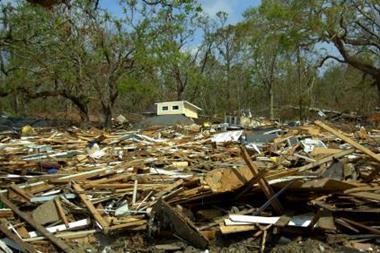Dear property insurance manager,
Thank you for the cheque reimbursing us for the damage to our roof in windstorm Kyrill. We are happy that you did not allow us to increase our deductible from £100 to £1,000 as we had suggested a few months earlier. The claim cost you, or more probably your reinsurers, £900 more than necessary.
Less than a month after Kyrill, the head of Swiss Re's atmospheric perils group, David Bresch, urged primary insurers to encourage homeowners to do more to strengthen their properties against storm damage. During a discussion at the catastrophe modelling conference 2007 organised in New Orleans by the Reinsurance Association of America (RAA), he argued that with the sort of incentive that some modest, increased risk sharing created by more suitable deductibles or small co-insurance, reinsurers could manage the potential implications of climate change with their clients.
Scientists like Bresch do not say that our increasing global temperatures will cause more extreme weather events, but they do say that there is evidence pointing that way. At the same time, scientists like Bresch who work for reinsurers are not waiting to reach a 90% confidence level before they advise their management that the possibility needs to be taken into account.
Both the policyholder and the reinsurer think higher deductibles, or at least the option of higher deductibles, are a good idea. The insurer sits between them. At some point, say after another big European windstorm, the insurer's position will become uncomfortable. It will be paying claims and coping with its reinsurers' pressure for higher rates or more risk retention on its part.
It is not difficult to imagine the scenario that follows. The insurer tells policyholders the minimum deductible has increased threefold. Because it has been imposed, better off policyholders are resentful; the poorer ones will struggle because they will get little or nothing back if they have a run of the mill loss, and they are resentful.
In the short term, this unsurprising possibility suggests that at a certain level in insurance companies, there can be a real failure to appreciate the policyholders' perspective. Longer term, there is the much more serious issue of climate change.
A message emerged clearly from the RAA conference and from our own climate change 2007 conference in London in March. However confident they are about trends, scientists will not predict how the weather will behave in the next year or two as a result of global warming, but that is the time frame within which insurance companies, and many other businesses, work. Competition for business is now. Results are reported quarterly, policies renewed annually.
Yet, now is the time for insurers to work with property owners to improve the quality of the risks. We will be better off even if the scientists turn out to have been overly pessimistic.
There may be a parallel to be drawn from the remarks of Stephen Byers, former UK cabinet minister and currently co-chair of the International Change Taskforce, at our climate change conference. He argued that people can see that something odd has been happening to the weather, and they would welcome good ideas. The risk for politicians, he said, is that green taxes are seen simply as a revenue raising exercise. The extra revenue needs to be used for good projects; otherwise, politicians will pay a high price.



















